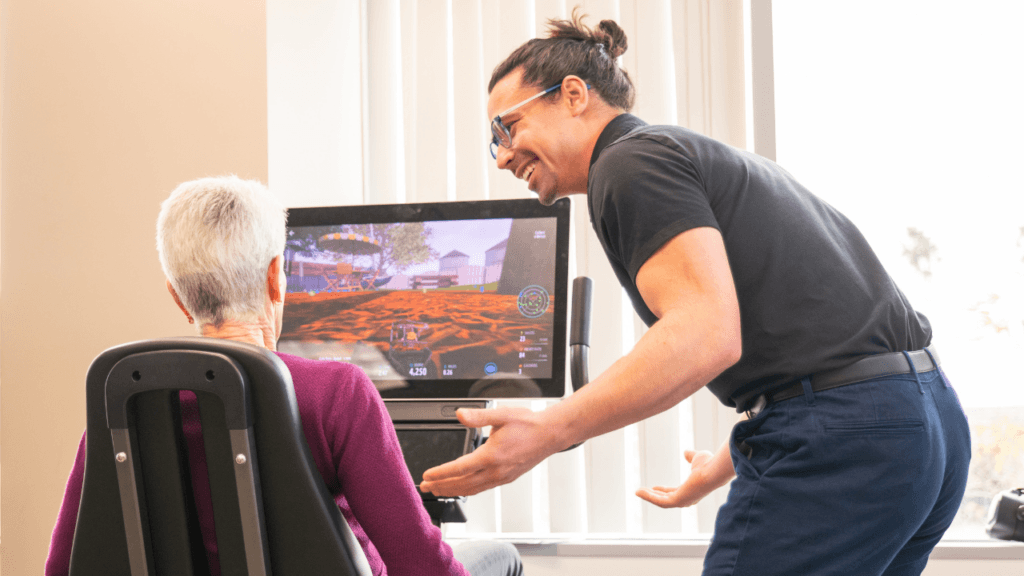

7 Essential Tips for Dementia Care Partners to Enhance Daily Life and Well-being
by Brianna Rauchman
Discover simple and practical tips to help you care for a loved one with dementia. Learn how to create a safe environment, encourage healthy eating, improve communication, manage their mental health, and more.
What is Dementia?
“Dementia is an overall decline in cognitive ability, usually impacting short-term memory (learning/recalling new information) and another cognitive ability (or more), such as decline in executive skills (organization, decision making) or language, or visual-spatial skills,” says Karen Miller, PhD, neuropsychologist, geropsychologist and senior director of the Brain Wellness and Lifestyle Program at Pacific Neuroscience Institute® (PNI®).
“In dementia, these declines typically impact one’s ability to be completely independent (i.e., the person may have difficulty managing finances or medications, difficulty/impairment in driving, etc.).
Caring for a Loved One With Dementia
Caring for a loved one with dementia presents unique challenges that require patience, understanding, and informed strategies to manage effectively. As the disease progresses, simple daily tasks become increasingly difficult for individuals, ultimately impacting their independence and overall quality of life.
Keep reading to learn seven important tips for enhancing the well-being of people living with dementia and their care partners.
1. Create a Safe and Supportive Environment

Prevent Items from Getting Lost
- Use clear, consistent places for everyday items (e.g., keys, glasses). Consider labeling drawers and cabinets with words or pictures.
- Implement technology solutions like GPS trackers for frequently misplaced items.
- Encourage routines to reduce the chances of items being lost.
Simplify the Home Layout
- Minimize clutter to reduce confusion and enhance mobility.
- Ensure good lighting to help with visibility and orientation.
- Use contrasting colors for critical items (e.g., toilet seat vs. floor) to aid recognition.
2. Encourage Healthy Eating

Adapting Meal Preparation
- Prepare meals that are easy to eat, visually appealing, and nutritious.
- Use adaptive utensils designed for individuals with grip challenges.
- Serve smaller, more frequent meals if they have difficulty eating large portions at once.
Creating a Pleasant Dining Experience
- Minimize distractions during meals to focus on eating.
- Encourage family-style meals to promote social interaction.
- Ensure the eating area is well-lit and inviting.
3. Enhance Communication

Simplify Communication
- Use simple, straightforward sentences and avoid open-ended questions.
- Maintain eye contact and use gestures to aid understanding.
- Be patient and give them time to respond.
Embrace Non-verbal Communication
- Pay attention to body language and facial expressions.
- Use touch to convey affection and reassurance.
4. Promote Physical Activity

Incorporate Routine Exercise
- Engage in simple, supervised physical activities such as walking or light gardening.
- Consider tailored exercise programs designed for individuals with dementia.
Safety in Mobility
- Use mobility aids as needed to prevent falls.
- Ensure shoes and clothing are comfortable and secure.
5. Support Mental Health and Cognitive Function

Engage in Cognitive Stimulating Activities
- Puzzles, memory games, and simple crafts can stimulate the mind.
- Incorporate music and art therapy, which have been shown to enhance cognitive function and mood.
Maintain Social Connections
- Encourage visits from friends and family.
- Explore local support groups and community activities tailored to individuals with dementia.
6. Manage Behavioral Changes

Identify Triggers
- Keep a diary to note when and why challenging behaviors occur.
- Modify the environment or routine to avoid identified triggers.
Provide Reassurance
- Stay calm and offer comfort if they become upset or agitated.
- Validate their feelings and redirect attention to a more positive activity.
7. Consult with Healthcare Professionals

PNI’s Brain Wellness & Lifestyle Program offers effective solutions for individuals with dementia and their care partners. Our primary goal is to slow down the progression of the condition through the provision of personalized nutrition plans, targeted exercises, and engaging mental activities. By joining our program, you are not only managing your loved one’s condition but actively improving both of your lives on a daily basis.
Additionally, we provide support groups where care partners can find professional guidance and connect with others who are on a similar journey. Through a comprehensive approach, we empower individuals to effectively care for their loved ones with dementia while prioritizing their own well-being.
How to Enroll in the Brain Wellness & Lifestyle Program
Offered in group or individual sessions, as well as both virtually or in-person, our program is made for everyone. Click here to sign up, or call 213-344-2037.
Useful Links
Related Articles
About the Author
Brianna Rauchman
Brianna Rauchman, BA, is the Communications Coordinator for the Lifestyle Program, where she helps develop outreach strategies to connect with an expanding audience. Her responsibilities include providing launch support, developing content, assisting with collateral design, and planning social media strategies.
Last updated: February 24th, 2024



